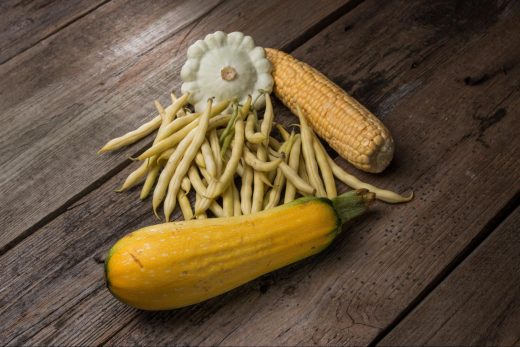
The day after Thanksgiving is Native American Heritage Day, a holiday created to acknowledge and honor Native Americans’ continued presence and culture. This edition of Weekly Bites celebrates Native American heritage by covering three stories of Native chefs and restaurateurs who are revitalizing traditional Native American foodways.
The way many of us learn about Native Americans in school is firmly rooted in the past, feeding the illusion that Native Americans are far and few between. This couldn’t be further from the truth! Native Americans are an integral part of our culture, and their cultural traditions — including culinary traditions — survive and thrive.
Read on for this edition of Weekly Bites where we cover how James Beard’s best new restaurant is Native American, how Native Americans are reclaiming agricultural traditions, and what Seattle’s Native American food scene looks like.
The best new restaurant is Indigenous
In 2022, James Beard named Minneapolis restaurant Owamni Best New Restaurant in the United States. The restaurant sits on Dakota land, in an area called Owamniyomni — the place of swirling water.
Chef Sean Sherman started the restaurant with the goal of creating a decolonized restaurant, through and through. All of the dishes are made without ingredients that came after colonization (for example, wheat flour, dairy, cane sugar, or black pepper). Instead, the food is made from seasonal and local ingredients, and uses methods of preparation like fermentation, smoking, and drying. While these methods may sound trendy, Chef Sherman says that Native Americans have always eaten like that, and that the traditional Native American diet is what the paleo diet wishes it could be.
The food isn’t the only Indigenous part of Owamni. The restaurant sources ingredients from Native farmers, like Ojibwe farmers who provide manoomin, a type of rice harvested from the bottom of canoes. Sherman also employs Native people as servers, cooks, and bartenders. “In Minneapolis, I could find food from all over the world,” Sherman says, “But nothing that represented the food or the people that were there before, which is completely insane.”
The New Yorker article goes in depth about Sherman’s life and career, as well as what it takes to keep a restaurant open despite setback after setback.
Seeds of Resistance
Native Americans have always been stewards of their land, growing what they need in order to live. Forced relocation and ongoing discrimination against Native American people have led to the decline of these agricultural practices.
In recent years, Native American communities have been reclaiming their ancestral farming traditions, and pushing for growing food in order to be healthier and more sustainable. Onondaga Nation Farm in Syracuse, New York is part of this food sovereignty movement. They acknowledge and celebrate their relationship and connection with the land, and focus on growing crops that have always been grown there, like “three sisters.”
“Three sisters” refers to the agricultural practice of growing corn, squash, and beans together. The result is a biological symbiosis. Like sisters (who actually get along), the plants work together to help each other thrive. Corn acts as a trellis for beans, and squash planted in the perimeter retains the soil’s moisture and naturally repels pests and weeds. These ingenious farming practices are what many Native American communities are hoping to preserve.
In addition to farming practices, trading seeds has a rich history in some Native communities. Before being forced onto the Trail of Tears, Native women would sow seeds into the hems of their dresses in the hopes of maintaining their connection to their lands and the foods it produces. Native Seeds/SEARCH, an organization based in Tucson, Arizona (Tohono O’odham land), is a nonprofit that helps connect Native communities to ancestral plants, including plants that are endangered.
Native Health in Phoenix, Arizona (O’odham and Maricopa land) is another nonprofit that seeks to preserve drought-resistant ways of planting.
These organizations aren’t just reclaiming farming practices, but offering Native American communities a more sustainable and sovereign way to source food. Amanda Whitesinger, the Indigenous wellness manager at Native Health, shares, “Having the garden helps us reclaim ourselves as Indigenous people and say, ‘This is tribal land, and we’re growing foods that kept our ancestors healthy.’”
The emerald city, otherwise known as Si’ahl
With an abundance of food trucks and international cuisines, Seattle is home to many food scenes. Now, we can add Native American food to that list. ʔálʔal (the Lushootseed word for “home,” pronounced “All-all”) opens in Seattle on November 29, 2022. Chief Seattle Club, a homelessness prevention nonprofit for Native Americans, is behind the new restaurant. The mission is twofold — to uplift the Native community and improve local understanding of Native food and culture.
Seattle, named after Chief Si’ahl of the Duwamish tribe, is home to many talented Indigenous artists and chefs, but the city lacks Native American restaurants and eateries. Thankfully, Native Soul and Off the Rez are two restaurants that are joining ʔálʔal in the effort to change that.
The movement is also drawing attention to the need for funding opportunities for Native ventures. Native Americans often face more obstacles than their non-Native counterparts when it comes to opening restaurants. People who have the time and resources to fill out business grant applications and PPP loans are rarely the ones who need it. Seattle also has strict permitting for eateries, and a lot of Native Americans don’t have the resources or funding to go through the whole process.
There’s much more to be done, especially on the side of policy, but we’re grateful for the progress that’s happening thanks to amazing organizations like Chief Seattle Club. We hope to hear of more Native American restaurants opening in cities across America!


